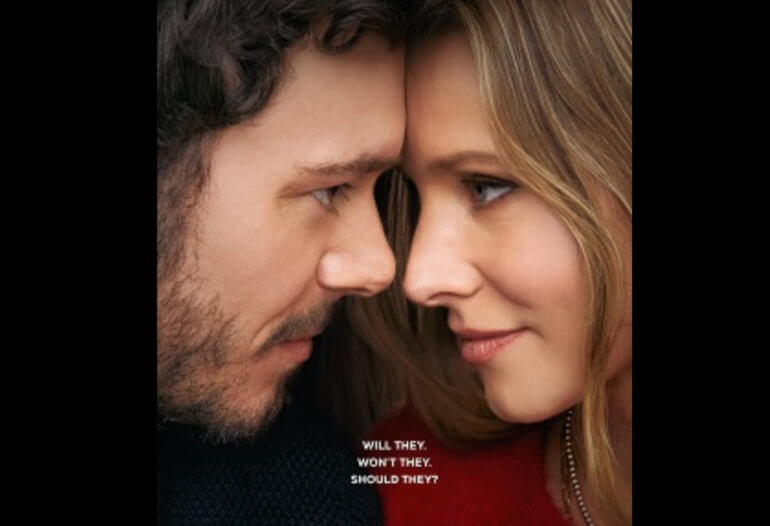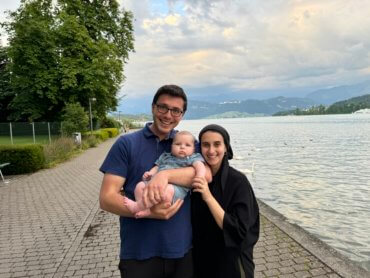
Nobody Wants This: Positive Jewish Male Representation, Much Else Falls Short
In early 2023, JITC Hollywood Bureau heard that podcaster Erin Foster was creating a series loosely based on her life. How she, a non-Jewish woman, fell in love with, converted, and married a Jewish guy. To make the plot salacious enough for a streamer, the Jewish guy became a rabbi. According to the 2021 Pew Study, 72% of non-Orthodox Jews married since 2010 married a non-Jew. Apparently the showrunners believed they needed a more unusual angle than what most of American Jewry is up to.
As someone who was raised as a proud Conservative Jew, whose mother imbued her daughters with the idea that intermarriage was a cardinal sin – mind you, eating non-kosher and not observing Shabbat were not – the premise of a show glorifying intermarriage with a rabbi, was off-putting. Characters throughout the show note that intermarriage leads to the extinction of the Jewish people. And as studies show – the non-Orthodox community is marrying itself out of existence.
What I Loved
We were happy to hear that the rabbi who converted Foster, Rabbi Steve Leder, a strong advocate for the Jewish people, was pulled in to consult for the show. Consultants are not writers nor do they get the final call for anything. I believe Rabbi Leder’s influence led to beautiful Torah teachings being shared throughout the series (side point: while I am a fan of You’re So Not Invited To My Bat Mitzvah for many reasons, one of my main suggestions for improvement was for Torah wisdom to be included in the storyline, so it was great to see some here). I’m sure the rabbi’s consulting also led to the details of the blessings and synagogue scenes coming across authentically. We got to watch how shabbat begins, with candle lighting, how shabbat ends, with seeing the first three stars, we learned about the problem of gossip (lashon hara) on a couple occasions, and that part of Jewish theology includes grappling with God.
Between Adam Brody playing “hot rabbi,” the nickname protagonist Noah Roklov picks up at a Jewish sleep away camp, and his character loving Judaism, giving over Torah wisdom, showing a deep appreciation of Jewish rituals, these were some rare and appreciated wins in Jewish representation. The first few episodes had charm and the writing was really entertaining, like when a car accidentally read a potentially antisemitic text message in front of its Jewish passengers. It was thrilling to see the cute, desirable guy be Jewish. Joanne, played by Kristen Bell, had a curiosity and appreciation for Noah’s faith, asking what different Jewish terms meant, even if it was a bit unrealistic for a non-Jewish woman living in Los Angeles to have never heard words like “shalom” and “shabbat” before. While we normally see Jews mocking Judaism on the big screen, this was a welcome departure. The banter between Noah and Joanne was adorable, even to my anti-interdating self. However, I would be remiss if I did not express how deeply this show missed the mark in a variety of important ways. So, let’s jump in! (SPOILER ALERTS below).
Jewish Women Are Less Attractive
Our introduction to Jewish women in the show starts off badly and continues that way. Noah’s almost fiancé, Rebecca, reveals that she has snuck through his private belongings in order to give herself the engagement ring that he purchased but hasn’t proposed to her with yet – a very off and weird thing to do. This violation of privacy is enough to end their relationship. (Compare that to when Joanne goes through a private box of Rebecca’s that Noah has been holding onto. In this case, Noah has compassion for Joanne’s curiosity.)
Once Noah has broken up with Rebecca, his congregation knows that he’s on the market. After services on Friday night, an unattractive Jewish woman is put forward as a potential mate, which Noah quickly passes over. Next, another eligible bachelorette is put forward who has just recovered from shingles. No one seemed to have caught why highlighting a diseased Jew would be problematic: Jews were accused of spreading disease in Europe for centuries, dating back to the 1300’s in Southern France, when Jews were accused of spreading leprosy to kill Christians. Pogroms ensued. These libels continued for hundreds of years, until after the rise of Nazis, when German propaganda described typhus, spread by lice, as a “disease characteristic of parasitic, subhuman people—the Jews.”
None of these subpar maideles caught Noah’s eye, because the shiksa-goddess, dressed in bright red, was waiting for him in the back of the sanctuary.
Shiksa
The word “shiksa,” an offensive word, is used throughout the show. The series was going to originally be called “Shiksa,” so good that the showrunners nixed that idea. While it can be said in jest to refer to a gentile woman with shiksappeal (thank you, Seinfeld), the Yiddish origin means “detestable” and went into use during the late 1800’s. This was a time when gentiles often treated Jews very poorly and when there was a growing concern (post Enlightenment) that Jewish men, who were newly emancipated from the ghettos would marry non-Jewish women and leave the fold. None of that context was given, but the xenophobia of the Jews, especially of the Jewish women, was rampant in the show. As someone who believes in Jews marrying Jews, to preserve our people, but holds no animosity towards non-Jews, it was frustrating that this nuanced historic perspective was not laid out clearly.
The “Shiksa” is Fetshisized, Jewish Women Are Frigid Shrews, Jewish Men Are Henpecked
There are a couple scenes – especially the basketball game and the bat mitzvah, when Joanne and then Joanne and her sister, enter the room and all the Jewish guys are left in a state of shock. The power of the gentile woman is so strong, the world stops for Jewish men, as they walk by. In an especially cringy moment, Noah’s brother, Sasha, holds up Joanne’s tiny tank top and says to Noah, “Oh my God, is this her shirt? It looks like a doll’s.” This happens shortly after we see that the brother’s frigid wife, Esther, refuses her husband’s advances. None of the Jewish women on the show are particularly attractive. They are certainly not held up as love interests or objects of desire. Even the actress who plays Rebecca, Emily Arlow, looks much more attractive in many red carpet photos in real life than she does in this show. The message is pretty clear – gentile women offer sex appeal. Jewish women plot, gossip and nag their rich husbands. (Noah’s parents’ impressive home is on display at the end of the show. We don’t see the non-Jewish characters living in particularly extravagant abodes.) Noah’s mother, Bina, his sister-in-law Esther, and Rebecca’s friends all conspire to keep the shiksa out, and they’re all quite nasty as they do.
The Jews Are Hypocrites and Disgusting
Jews being called perfidious – deceitful and untrustworthy – is an old trope. A rabbi hiding his gentile girlfriend in various situations, certainly hovers in that space. A married synagogue board member having an affair and then giving a large donation, to buy Noah’s silence, is even more on the nose. But perhaps the most stomach churning moment of the series – though the ending was a close second, (or maybe the winner) – was when Noah’s devout mother publicly humiliates Joanne for bringing pig (prosciutto) into her home as a gift, which she dramatically throws in the garbage. Then, during the brunch, Joanne discovers Noah’s mother not only secretly scarfing down the prosciutto in the kitchen, we later learn that his mother has fished the precious pork out of the refuse, because the temptation to eat pork is just too strong. Which maybe is the perfect set up for what her son does later…
The Temptations To Not Be Jewish Are Too Strong
The ending of this show really threw me for a loop. Intermarriage is statistically bad for Jewish continuity, but a lot of Jews were not given over that message by their elders like I was. They were told to put love first and maybe figured that someone else would be in charge of the continuation of the Jewish people. I’m not here to judge. This is the reality for most of US Jewry, and I love my fellow Jew. What IS upsetting is that our precious handsome, Judaism-loving rabbi is willing to throw it all away – for the gentile goddess. At the end of the last episode, Joanne shows tremendous personal growth when she realizes that she is not fit to be a rebbetzin, that she is not ready to convert with sincerity today or maybe ever. She unburdens Noah of the responsibility of dumping her by walking away and moving on and telling him not to follow.
The show could have ended there. I mean – it is loosely based on the story of a non-Jewish woman converting – so that’s what we thought we were getting, but I would have been satisfied if they parted ways and Noah found his bashert in a nice Jewish girl. Instead, he chases her. And when Joanne reminds Noah that he can’t be a rabbi – his lifelong dream, the thing we were told earlier that gives his life meaning – if he is with her, Noah only responds with a kiss. Like his mother, overcome by the temptation of the prosciutto, Noah becomes part of the extinction of the Jewish people. The message is clear – Judaism is onerous and burdensome and there is great pleasure in leaving it behind. Joanne’s self-actualization is becoming selfless. Noah’s is throwing Judaism away.
Recommendations
If we had trained the showrunners, below is the guidance we would have given. We have a showrunner training with a major agency scheduled for after our 2nd Jewish Media Awards and our fact sheet, that the training is based on, is now being used at major studios. We built our training not only after consuming many hours of television and film (which we have cataloged), not only by doing a study with the Norman Lear Center on US scripted TV shows from 2021-2022 (that is about to be released), we also spent quite some time reading and learning from the fact sheets of other minority groups. Not surprisingly, we found a lot of common ground.
- We want to see more instances of Jewish women being loved. We got this from a Black fact sheet, which noted that so many Black women are single mothers. This made us realize that in many TV shows and films, the Jewish woman is passed over for the more desirable gentile woman or she is abused by her extremist Orthodox husband. As I noted previously, You’re So Not Invited To My Bat Mitzvah and Jewish Matchmaking (both Netflix!) had examples of happily married Jewish couples and Jews falling in love with one another.
- We want to stop the focus on the Eurocentric beauty standard. We got this messaging from the Asian and Black fact sheets. It applies to Jews too. Why do some of our most beautiful Jewish actresses, like Gal Gadot, Scarlett Johansson, and Mila Kunis never play Jews? They are the heartthrobs and love interests for major shows and films, but never play the Jew. We can and should put our most beautiful women to play these parts. Elevating the “shiksa” above Jewish women, who in the majority of cases are ethnically different, because they are of Levantine descent, is racist.
- We need to stop the “gentile savior phenomenon.” Just as Black people are sick of needing to be saved by white people, Jews need not be saved by non-Jews. We are enough. Our heritage and community and traditions and history are enough.
- Stop showing devout Jews as hypocrites. Of course some are. Most are sincere.
- This story could have worked very similarly if there was a secular Jewish girl and a religious Jewish guy who felt a spark when they met and had to figure out how to bridge their two very different worlds.
- Let’s see more stories where characters choose Judaism. The set up seemed like this was going to be one of those stories. It’s why the ending was so devastating. In the secular girl meets the religious guy suggestion above, they could both choose their Jewish identity.
Conclusion
The crazy thing about this series coming out now, in our post October 7th world, is that interdating and intermarriage anecdotally seems to be down for the first time in decades, because Jews are reporting that many non-Jews they meet on dating sites are refusing to be romantic with “zionists.” The uptick of hate against the lone Jewish state and those Jews who support it is turning a sizable number of secular Jews to be the most insular they’ve been their entire lives. With the recently released FBI 2023 Hate Crimes report naming Jews as the most attacked minority group in the US, despite only being 2% of the population, opportunities for Jews to be humanized and not caricatured are more important than ever. Jews and non-Jews alike seeing Jews taking pride in their heritage, without being nasty to those with different backgrounds, is essential.
As we continue to deepen our relationships with our studio contacts, we are here to see the good and celebrate it, but also need to be honest about where we need to go. Narrative story change work for other groups took decades. We’re only a couple years into our advocacy. We are optimistic about where we can go from here and look forward to our trainings and fact sheet making a meaningful impact on Hollywood.
If you found this content meaningful and want to help further our mission through our Keter, Makom, and Tikun branches, please consider becoming a Change Maker today.








1 comment
Sort by
All good suggestions!
But what about the supposedly Russian-Jewish mother? None of us from the FSU would recognize our mothers in her. She acts more like a stereotypical Jewish mother from Brooklyn. Another opportunity missed – an authentic Russian Jews would make for a much more interesting and genuinely conflicting role!